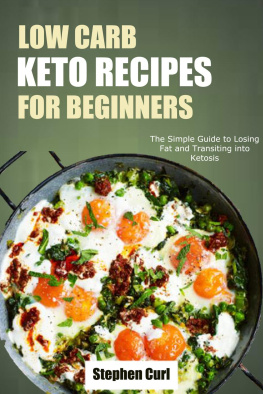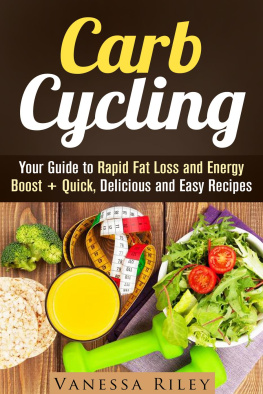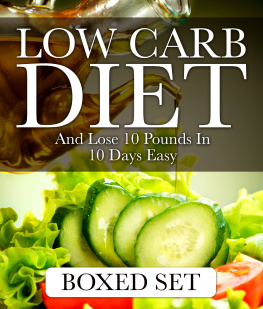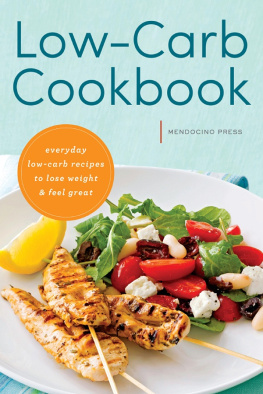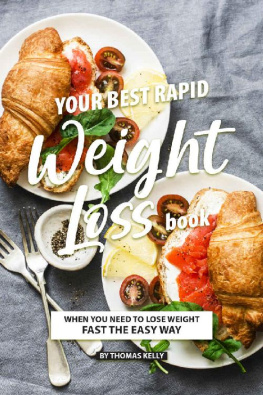Copyright [2020] [Sarah C. Smith]
All rights reserved
All rights for this book here presented belong exclusively to the author.
Usage or reproduction of the text is forbidden and requires a clear consent of the author in case of expectations.
ISBN - 9798671068603
Table of Contents
Introduction
What is a low carb diet?
A low carb diet focuses on significantly reducing the amount of carbohydrates you normally consume. As a major source of energy for the body, reducing and changing the carbs that you eat can have a positive impact on your health and result in fast weight loss. A low carb diet usually limits daily carbohydrate consumption to a maximum of 150g a day, or usually around 50-100g a day, with a focus on foods rich in protein and good fats. On a basic low carb diet, you can personalise it to your liking, as its all about reducing your normal amount of carb intake, rather than a specific amount. You can adjust to whatever suits you.
How does it work?
When carbohydrates are consumed, they are turned into glucose. Glucose is a form of energy that is then carried into the bodys cells, and when there is an excess of it, it can result in a rise in insulin and blood sugar levels. This in turn can also lead to weight gain when too many carbs are consumed and the excess glucose is absorbed by the body. Using a low carb diet means that once the body has burned its reserve of carbohydrates, it then turns to protein and fats instead.
What are some of the benefits?
There are multiple benefits to a low carb diet when it is undertaken properly. When you reduce your carb intake, you significantly reduce your blood sugar level and insulin level, which can be particularly beneficial for diabetic people. With no more excess glucose floating around in your blood cells, these figures will look dramatically better, which improves your overall health.
Additionally, your blood pressure and cholesterol will improve, which is critical for heart health. On top of all of these benefits, one of the biggest benefits you will notice is fast and consistent weight loss or weight maintenance, depending on how much you cut back on carbs. Much of this weight will be lost around your midsection, which can help towards a healthier heart.
Below are listed some of the other benefits youll notice on your 28 day journey of a low carb diet, as well as how it can affect changes in your body.
Can everyone do it?
You should always consult your doctor before dramatically changing your diet and lifestyle, particularly if you have any underlying health issues. In general, a low carb diet can be good for everyone when practised correctly, and particularly beneficial for diabetics who need to maintain a low insulin level. If you do have diabetes, its important to talk to your doctor and choose the correct type of low carb diet for your needs. If you are breastfeeding and/or have blood pressure issues, its also important to discuss this with your doctor. If you have been advised by a medical professional to gain weight, you should consider an alternative diet or consult your physician first to strike the correct balance of foods in your diet.
Diet vs lifestyle
You may know many people that seem to constantly be on diets with little success, or success that reverses just as quickly. Its important to note that although this book includes a 28 day weight loss plan, your focus should be on maintaining a healthy lifestyle, rather than engaging in a quick fix diet. As youve likely heard before, its a lifestyle change, not a diet, because its true!
This book is a tool to help you get started on a low carb diet, which you can then continue in whichever way suits you and your lifestyle. As well go on to show you, a low carb diet has multiple results that will be beneficial to your life and will hopefully inspire you to continue after the 28 days.
Exercise and an active lifestyle
While there are no exercises detailed in this book, its important to maintain an active lifestyle alongside your low carb diet. Getting outside is incredibly beneficial for physical and mental health, and gentle or moderate exercise several times a week - such as walking, cycling, swimming, yoga, or strength training - produces endorphins that keep your mind happy and focused. Implementing exercise in your daily life improves many other aspects of your health like sleep, focus and concentration during work, immunity and the ability to fight illness, skin condition, fitness, and maintaining a healthy weight.
Benefits of a low carb diet
Increased energy
It might seem that when you take away one of the bodys largest reserves of energy, you might start feeling sluggish. In actuality, many people over-consume the amount of carbohydrates that they should be consuming, which creates an excess of glucose in the body that isnt used, and therefore you are more likely to feel sluggish and lethargic when you eat too many carbs. On a diet of much fewer carbs, your body isnt overloaded with glucose anymore, and instead turns to protein and fat for energy. Youll find as a result that you feel more energised on a day to day basis, as quickly as a couple of days into the diet.
Better sleep
An obvious side effect of having more energy during the day is usually that you sleep better at night. It can be common for people to eat late at night and indulge in a meal that is heavy and overloaded with carbs. You may find that a couple of hours later when you are in bed trying to get to sleep, you have trouble. This is because your body is still busy trying to break down all of the heavy carbs youve given it, and a horizontal position can hinder that and make you feel uncomfortable and restless.
Eating a lighter meal that is richer in protein and healthy fats means that your body is much better able to handle it and break it down, so that by the time bedtime rolls around, your body isnt still in the early stages of digestion, and is ready to wind down and rest.
Weight loss
One of the biggest reasons a low carb diet has become popular in recent years is for the rapid weight loss people notice after only a couple of weeks. Losing weight isnt all about calories and counting how many of them you consume, but focusing on what type of food you are consuming and its nutritional value. Carbohydrates shouldnt be considered the enemy when it comes to a healthy diet, as there are many complex carbs that are good for the body, rather than starchy carbohydrates like fast food that are high in carbs but have few benefits in terms of providing fuel. For example, a sweet potato may have more calories than a regular potato, but its nutritional value is much higher.
Improved focus and concentration
This benefit goes hand in hand with an increase in energy. Without heavy, starchy carbohydrates to weigh you down, youll feel more energised. This also means youll feel a difference at work or when focusing on a task. Without needing to focus on a large amount of food to digest and break down, your brain can instead focus on a mental task. Your brain is instead fuelled by proteins and good fats, which are key to brain health and activity. Youll find that your focus and concentration are significantly improved and tasks at work become a lot easier.
A more stable appetite
It may seem that the more you eat, the more you want to eat. This is often because when you overeat, you stretch your stomach, and your capacity to eat goes up. When you reduce your intake, you may feel hungry or like you want to eat more in the beginning, which is normal and nothing to worry about. Your body will quickly get used to the new food intake and adjust accordingly, and youll find that times when you would often snack or feel hungry in the past, your appetite has since changed.








